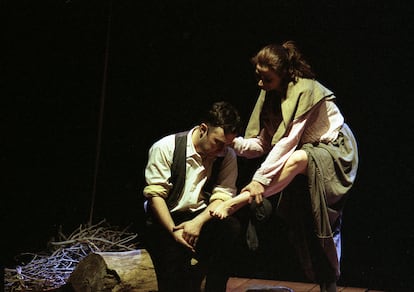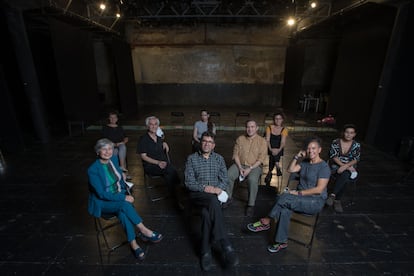The fourth wall is a term coined by Diderot and intimately linked to the theater, an imaginary wall that separates the fiction of reality, which delimits the space/time of the action that takes place on the stage in front of the public and that, metaphorically, is Break when a character interacts with spectators. In 1985, a group of young people opened a place on Olivar Street in Madrid aimed at making a different theater than usual then. They called him a fourth wall. It was just a room with 20 chairs where a few performers acted to a scarce meter from the public, influenced by the new winds (in dramaturgy, direction and interpretation) that the Argentine theater exiled, one of them, Ángel ruggiero, closely linked to birth, closely linked to birth of space.
At first they could not even announce their programming, because in the newspapers they were told that what they did was not theater. But the mouth to ear made its magic and some journalists carried out by curiosity began to go, the first the longing So closely the work of the interpreters. A revolution in Madrid at that time, the Madrid of the Movement, where the theater that was done was still the nineteenth Guillermo Heras led, under the Ministry of Culture, and that a few years later would disappear).
Four decades have passed. Today the fourth wall, distinguished with the National Theater Award in 2020, is a room, a company and a consolidated, recognized and appreciated school, which lives this proud birthday of a story that places it as a pioneer in what was known as movement of alternative theater rooms in Madrid and Spain, along with disappeared spaces such as the Triangle Room, Test 100, the song of the goat or the Pradillo Theater, which is the only one that also subsists since then. Of those crazy people who began with the adventure, they are only today linked to the room (after the death of Elvira Sorolla two years ago) Asunción Rivero and Javier García Yagüe. The latter leads a team of more than 40 people who continues to fight month by month to achieve, as he says, “not so much profitability, but viability, because in these conditions the theater is never profitable, it is something very fragile and, unfortunately , very subject in Spain to political fluctuations. We would like this type of projects to be sustained without public aid, but it is very complicated right now. We have always said that we are semi -public theaters, because we cover the needs of creators and citizens. ”
Needs that they detected and then others assumed, such as when in the change of the century the great public and many private theaters began to open their small rooms. That’s when the fourth wall put his ear again and wondered again: What is the need now? That is why since they opened their current headquarters on Ercilla Street, in 1992, they have led to innovation in contemporary theater and dance (and in children’s theater), being able to show off, for example, of having hosted the premiere of early works of authors and authors such as Juan Mayorga (More ash1992), Alfredo Sanzol (Laughs and destruction2006), Angelica Liddell (The false suicide2000; And the fish went out to fight against men2003) or Rodrigo García (I bought a shovel in Ikea to dig my grave2002; Ronald’s story, McDonald’s clown2003); Companies such as Southern, Chévere, Micomicón, Animalario, UR Teatro (the mythical assembly of The dream of a summer nightfrom Shakespeare, directed by Helena Pimenta, in 1993) or dance artists such as Luz Arcas, Sol Picó, Malio hair, Carmen Werner, Chevy Muraday, La Ribot or Mónica Valenciano. To this we must add the milestones of the Fourth Wall Company with three trilogies that have remained for history: the Youth trilogy (Hands, You’re welcome y 24/7from 1999), the Unforeseen trilogy (Café, Possible rebellions y Always partyas of 2007) and the Black trilogy (Nothing to lose, Instructions for walking on the wire y So many slaves, so many enemiesfrom 2015).

Triptych of life
Facing 40 years as an independent and stable theater has led them to look back, look at a lifetime. And this is how, for two years, they have been working on what they have called precisely Triptych of life, in which the witness passes to three creators linked to the room to release, one per month, a drop -down of three works that intend to respond, aware of the unabarcable of the subject, to the question of whether it is possible to tell life. “As a company we have always been interested in intervening in the social debate,” says Javier G. Yagüe. We have worked based on trilogies with the intention of transcending, to face long -range projects, which were not ephemeral, that will deepen beyond everyday and circumstantial. ”
The first of the triptych pieces, which opens this Thursday, February 13, is All housesdirected by Aldara Molero, with Dramaturgy of Natalia Mariño. The work is a fresh frantic stories, fragmented and crossed, which contrast the movement of the universe, in astrophysical terms, with the incessant rhythm of contemporary life in the cities, the enormous of the cosmos in front of the sky of the small, where It is increasingly difficult to find a time to pause time, where only great loves and great pains can stop us for a moment, speaking to what extent the socio -labor situation of each allows or not to recreate in the pause. In that frenzy, the work also reflects on how what happens in the life of some affects the lives of others.
As a breakdown of this first work, the second will arrive on March 13, Murmurwhere the death of a common friend stops the life of a group of friends in a desktop that, inspired by the story of The Colloquium of the Birdsends up becoming a kind of mystical and magical celebration. It is directed by Aitana Sar with the collaboration in the dramaturgy of Miguel Valentín. On April 10 the triptych is completed with the premiere of Everything I see will survive mewhere the director Raquel Alarcón brings together a series of short pieces signed by Lucía Carballal, Pablo Remón, Mélanie Werder, Roberto Martín Maiztegui and Esther García Llovet to look at life from the echoes and memories of childhood and raise a tribute to the power of the word to create worlds and anchor existence.
The celebration will reach its culmination next July with the eleventh edition of the Essencia Festival, which will bring together many of the creators and creators who have passed through the room, companions and travel companions who share a philosophy of life based on the commitment and fidelity regarding the political, social and cultural values that have guided the multiple and incessant activity of the fourth wall during these 40 years.

